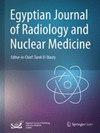乳腺核磁共振成像的乳腺水肿评分:其在预测乳腺癌分子亚型中的价值及其对腋窝淋巴结转移的影响
IF 0.5
Q4 RADIOLOGY, NUCLEAR MEDICINE & MEDICAL IMAGING
Egyptian Journal of Radiology and Nuclear Medicine
Pub Date : 2024-04-05
DOI:10.1186/s43055-024-01243-w
引用次数: 0
摘要
由于许多新诊断的乳腺癌患者都做过乳腺磁共振成像,如果能持续确定分子亚型,并在诊断成像的基础上提供预后信息,那么术前乳腺磁共振成像的价值就会提高。乳房水肿可提高预测浸润性乳腺癌患者分子亚型及临床和病理结果的能力。根据磁共振成像发现的乳腺水肿来预测乳腺癌的预后,将有助于预处理计划和预后判断。T2 加权图像和 STIR 上的乳腺水肿按 1 至 4 级评分,具体如下:(a) 乳房水肿评分(BES)1,无水肿;(b) BES 2,瘤周水肿;(c) BES 3,胸前水肿;(d) BES 4,皮下水肿(怀疑隐匿性炎性乳腺癌 "IBC")。腋窝淋巴结的状态和数量也在 T2 和 STIR 以及使用造影剂后进行了评估。这项工作的目的是评估与肿瘤相关的乳腺水肿 MRI 特征在区分乳腺癌分子亚型中的作用及其对乳腺癌患者病理腋窝淋巴结的影响。BES 与乳腺癌分子亚型、肿块大小、Ki-67 表达、腋窝淋巴结状态和腋窝淋巴结数量之间存在非常显著的差异(分别为 p < 0.0001、0.045、< 0.0001、< 0.0001 和 < 0.0001)。然而,在所研究的肿块中,BES 与组织病理学分级之间无明显差异,如 p 值 = 0.49。与肿瘤相关的乳腺水肿磁共振成像特征可能有助于区分乳腺癌的分子亚型,并可作为一种有前途的特征用于提高乳腺癌患者病理腋窝淋巴结的预测性能,从而有助于术前治疗计划和预后结果。本文章由计算机程序翻译,如有差异,请以英文原文为准。
Breast edema score at breast MRI: its value in prediction of molecular subtype of breast cancer and its impact on axillary LN metastasis
Since many newly diagnosed breast cancer patients have breast MRI, the value of preoperative breast magnetic resonance imaging would improve if molecular subtypes could be consistently identified, and prognostic information provided in addition to diagnostic imaging. Breast edema may improve the ability to predict molecular subtypes and clinical and pathological outcomes in invasive breast cancer patients. The prognosis for breast cancer prognosis based on the findings of breast edema by magnetic resonance imaging will be useful in both pretreatment planning and prognosis. Breast edema on T2-weighted images and STIR was scored on a scale of 1 to 4, as follows: (a) breast edema score (BES) 1, no edema; (b) BES 2, peritumoral edema; (c) BES 3, pre pectoral edema; and (d) BES 4, subcutaneous edema (suspicious for occult inflammatory breast cancer “IBC”). Axillary lymph node status and number were also evaluated in T2 and STIR and after contrast administration. The aim of this work was to assess the role of tumour-related breast edema MRI features in distinguishing molecular subtypes of breast cancer and its effect on pathological axillary lymph nodes in patients with breast cancer. There was a highly significant difference between BES with respect to the molecular subtypes of breast cancer, size of the mass, Ki-67 expression, LN status, and LN number (p < 0.0001, 0.045, < 0.0001, < 0.0001, and < 0.0001 respectively). However, there was no significant difference between BES and histopathological grade in studied masses, such as p-value = 0.49. Tumour-related breast edema MRI characteristics may be useful in distinguishing molecular subtypes of breast cancer and could be used as a promising feature to improve the predictive performance of pathological axillary lymph nodes in patients with breast cancer, contributing to preoperative treatment planning and prognostic outcome.
求助全文
通过发布文献求助,成功后即可免费获取论文全文。
去求助
来源期刊

Egyptian Journal of Radiology and Nuclear Medicine
Medicine-Radiology, Nuclear Medicine and Imaging
CiteScore
1.70
自引率
10.00%
发文量
233
审稿时长
27 weeks
 求助内容:
求助内容: 应助结果提醒方式:
应助结果提醒方式:


